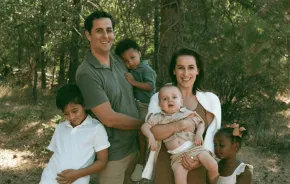
It seems like as soon as I had children and reached my mid-30s, men stopped catcalling and harassing me in public spaces. Then, in May, I found myself out with three teen girls. As we crossed the street, I made eye contact with a man in a pick-up truck. Was he going to stop for us? He held my gaze before saying, “Yellow pussy jack-off.”
 Boom. Quickly, I herded my daughter and her friends away from him, saying we should head back to the neighborhood’s crowded center. I thought none of the girls had caught what he said, but later one approached me and said, “Did you hear that man?”
Boom. Quickly, I herded my daughter and her friends away from him, saying we should head back to the neighborhood’s crowded center. I thought none of the girls had caught what he said, but later one approached me and said, “Did you hear that man?”
Yes, I told her, I had and it felt horrible and crazy and wrong. I explained verbal harassment from strangers hadn’t happened to me in a long time, but that I was going to do some research and find the best possible response for when this happens again because sadly, it will happen again.
According to one 2014 study, 65 percent of a surveyed 2,000 women reported being harassed on the street. Street gender-based street harassment includes catcalls, sexually explicit comments, sexist remarks, homophobic slurs, groping, leering, stalking, flashing and assault, as defined by the nonprofit Stop Street Harassment. The man’s comment on that May afternoon definitely fits that definition.
So does what this woman hears in this video. You may have seen it; the 2-minute compilation of the street harassment a woman experienced while walking around New York City for 10 hours went viral. It has more than 44 million YouTube views to date.
During the video, more than 100 men call out phrases like “Damn!” and “Smile! and "Hey, beautiful!” One man walks next to the woman without speaking to her for 10 long minutes.
There's plenty of research showing why men harass women, Holly Kearl, executive director of Stop Street Harassment, told NPR earlier this month. They’re bored; they want to bond with male friends; they want to assert power. But I wanted to know what my daughter and her female friends could do when such street harassment — be it “Hey beautiful!” to the ugly taunt we experienced in May — happens to them. How do I empower them?
What I learned
Ignoring and getting away from the perpetrator is an appropriate and safety-minded response to verbal catcalling and harassment, says Joanne Factor, founder and instructor at Strategic Living. This Seattle-based organization teaches safety and self-defense training skills to females and other vulnerable populations. Factor also recommends the following:
- Ignore the harasser and move yourself physically away. “Make sure [the harasser] isn’t following you, trying to get closer or staring even after you’ve moved out of range,” Factor says. “Very often, people are tempted to say something back to the person, but this may escalate the situation and that’s something you really don’t want.”
- Move toward a public place with lots of people and preferably with at least some you know. After being harassed, people often make themselves smaller and walk faster, taking shorter steps. Factor teaches her students to instead use expansive body language. “Make yourself look bigger — back straight, eyes forward. Keep breathing — take a few deep breathes, if you can — and lengthen your stride,” Factor says. “Hold yourself with confidence and know that you’re not the one at fault for someone catcalling.” To help with this, Factor recommends watching this TED Talk about power stances by Amy Cuddy, a professor and researcher at Harvard Business School.
- Tell someone. Factor encourages anyone, especially young adults, who experiences any kind of harassment to tell a trusting and supportive adult. Hopefully the adult will affirm that the harassment had nothing to do with anything the person who was harassed did.
The most important thing I learned: Talk. While I may think any form of street harassment — even something more “mild” like “Hey, beautiful” — is gross and assume my daughters agree, it still needs to be discussed.
“Our girls live in a culture that says looks are all important,” says sexual health educator Amy Lang. “[So catcalling] might make them think, ‘Oh, they’re interested in me.' They might want to go talk to the people who are calling out to them. The bottom line is none of this is safe or a good introduction into meeting people.”
Talk to your boys, too. Lang says parents should let their sons know catcalling is not OK behavior. “If your son’s friends are catcalling, help him brainstorm good comebacks to counter these interactions,” she says. “Maybe if a friend says, ‘Hey baby!’ to someone, [your son] can say, ‘I do not know him’ or ‘Dude, seriously? Would you talk to your sister like that?’”
Keep the conversation going
|











